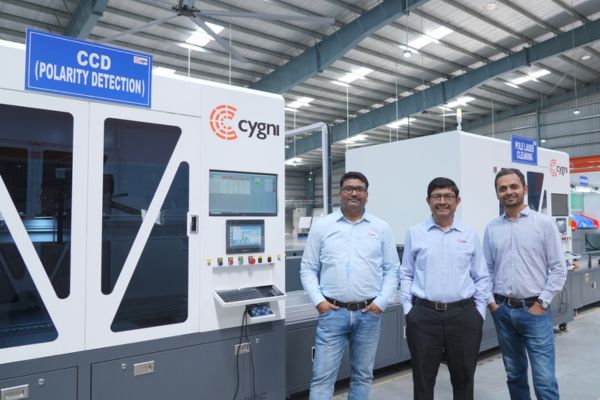Hyderabad-headquartered Cygni Energy, India’s largest independent energy storage solutions company, announced the commencement of its Phase-I, fully operational and automated Battery Energy Storage System (BESS) Gigafactory. Located in E-Mobility Valley, at the Electronics Manufacturing Clusters (EMC) Maheshwaram, Hyderabad, it is also India’s first “Leadership in Energy and Environmental Design” (LEED) qualified facility equipped with an Advanced Engineering Lab and Battery Management System (BMS) Lab.
Set up with an investment of over ₹100 crores, the 1,60,000 sq. ft Phase-I facility is located on a 5-acre campus and is designed with an initial capacity to produce 4.8 GWh of high-capacity battery packs for electric vehicles and energy storage systems. These advanced BESS systems will cater to large grid-scale stationary storage projects and Independent Power Producers (IPPs).
Shri. Jayesh Ranjan, Special Chief Secretary to Government of Telangana, and CEO Industry & Investment Cell in CMO, unveiled the first phase in the presence of Prof. Ashok Jhunjhunwala, Chairman, IIIT-Hyderabad, Mr. Srini Raju, Founder, iLabs Group, alongside many industrialists and the leadership team of Cygni on Wednesday.
In his address Shri. Jayesh Ranjan commended Cygni for completing its first milestone and setting up the BESS Gigafactory. “The inauguration of Cygni’s battery manufacturing gigafactory in Telangana marks a transformative step toward sustainable energy, manufacturing excellence, and innovation. This facility not only strengthens India’s commitment to clean energy but also creates jobs, fosters local talent, and builds a robust ecosystem for the future of energy storage solutions”.
Venkat Rajaraman, Founder and CEO of Cygni said,“This Gigafactory positions us to lead in the energy storage sector, delivering high-quality, safe battery packs across multiple applications. Cygni’s Automated BESS Assembly Line is engineered for advanced, high-quality BESS module manufacturing, leveraging globally recognized best practices such as Poka-Yoke-enabled stations and end-to-end traceability. We plan to grow exponentially in energy storage over the next few years in India and internationally”.
“In Phase II, we are scaling our Gigafactory’s capacity to 10.8 GWh in the existing facility itself. With a total investment of Rs. 250 Cr across 2 phases, this will result in direct and indirect job creation of over 1,000 jobs in the next 24 months. As part of this expansion, we will be adding three additional automated 2 GWh cell-to-pack manufacturing lines and container integration facilities to our existing lines, to meet the rising demand for stationary and e-mobility storage applications.” Rajaraman added.
Going forward, Cygni will provide advanced high-capacity energy storage solutions featuring modular, scalable designs and integrated with Machine Learning for predictive analysis, Digital Twin technology for real-time monitoring, high-performance energy management systems, seamless smart grid-code integration, and precision-engineered manufacturing. It also leverages research on futuristic technologies and battery chemistries through its long-term partnership with IIT-Madras, such as Cell-to-Pack (CTP) and Cell-to-Chassis (CTC) Design Architectures, sodium-ion batteries, and super-capacitors.
Cygni has manufactured and delivered 500 MWh of batteries for the power and energy segment. Currently, it has a pipeline of 1 GWh in orders for BESS projects and EV battery packs, backed by a nationwide service network and an experienced project commissioning team.
This production line is capable of manufacturing 105kWh liquid cooled base modules using advanced 314Ah cells, serving as the fundamental building blocks for nearly all energy storage containers worldwide. The Manufacturing Execution System (MES) Software in this BESS manufacturing line ensures seamless production monitoring, real-time data analytics, quality control, and enhanced traceability, driving operational efficiency and product reliability.
Ongoing R&D at the Gigafactory will include development of innovative energy storage solutions with Sodium-ion chemistry, thermal management strategies to improve safety, and advanced Energy Management System (EMS) algorithms to cater to evolving grid-code and design of India specific energy storage solutions.


















